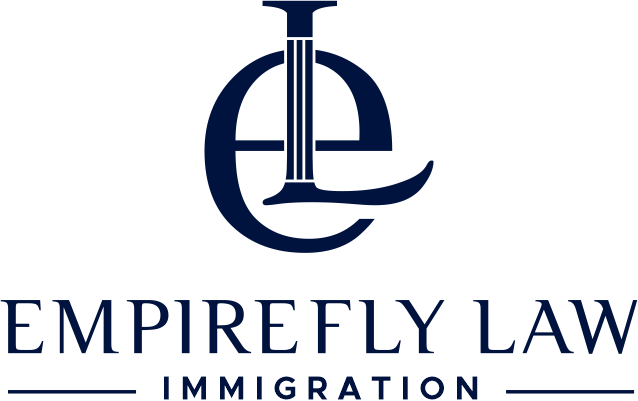Immigration Waivers
Our Services
Immigration Waivers for African Immigrants
We are Experts at Overcoming United States Immigration Barriers for African Immigrants
At Empirefly Law Firm, we specialize in helping African immigrants overcome the challenges and barriers they may face during their immigration journey through the use of immigration waivers. Our experienced attorneys provide comprehensive legal guidance and personalized support to ensure the best possible outcome for your waiver application.
What are Immigration Waivers?
Immigration waivers are legal remedies that allow individuals who are otherwise inadmissible to the United States to obtain a visa or adjust their status. Various grounds of inadmissibility, such as previous immigration violations, criminal convictions, or health-related issues, can be waived under certain circumstances, enabling applicants to move forward with their immigration process.
Types of Immigration Waivers
Waiver of Inadmissibility for Unlawful Presence (I-601A Provisional Waiver):
- Available to individuals who have accrued unlawful presence in the U.S. and are applying for a family-based immigrant visa.
- Requires proving that denying the waiver would cause extreme hardship to a qualifying U.S. citizen or lawful permanent resident relative.
Waiver for Criminal Grounds (I-601 Waiver):
- Available to individuals who have been convicted of certain crimes but can demonstrate rehabilitation and that their inadmissibility would cause extreme hardship to a qualifying relative.
Waiver for Misrepresentation or Fraud (I-601 Waiver):
- For individuals who have committed immigration fraud or misrepresentation but can show that their exclusion would cause extreme hardship to a qualifying relative.
Health-Related Waivers:
- Available for individuals with certain medical conditions that would otherwise render them inadmissible but can demonstrate that they pose no significant public health risk and that their admission would not burden the U.S. healthcare system.
Waiver for Previous Deportation or Removal (I-212 Waiver):
- For individuals who have been previously deported or removed and seek permission to reapply for admission to the U.S.
Waiver Application Process
Determine Eligibility:
- Our attorneys will assess your specific situation to determine if you qualify for any immigration waivers and advise on the best course of action.
Prepare Supporting Evidence:
- Gather evidence to demonstrate the qualifying hardship to your U.S. citizen or lawful permanent resident relative, rehabilitation efforts, or other mitigating factors.
File the Waiver Application:
- Complete and submit the appropriate waiver application forms (e.g., Form I-601 or I-601A) along with supporting documentation and fees.
Respond to Requests for Evidence (RFEs):
- If USCIS issues an RFE, our attorneys will help you respond with additional evidence or clarifications needed to support your waiver application.
Await Decision:
- USCIS will review your waiver application and supporting documents to make a decision. If approved, you can proceed with your immigration process.
Why Choose Empirefly Law Firm?
Expert Legal Guidance:
- Our attorneys have extensive experience in handling complex immigration waiver cases and provide personalized advice tailored to your unique situation.
Comprehensive Support:
- We offer support at every step of the waiver application process, from determining eligibility to gathering evidence and responding to RFEs.
Proven Success:
- Our firm has a strong track record of successfully helping African immigrants overcome inadmissibility barriers through the use of immigration waivers.
Client-Centered Approach:
- We understand the challenges and stresses of the immigration process and are committed to making it as smooth and stress-free as possible for you.
Schedule a Consultation
Facing immigration barriers? Contact Empirefly Law Firm today to schedule a consultation. Our experienced attorneys are here to guide you through the immigration waiver process and help you overcome the obstacles to achieving your U.S. immigration goals.
GET TO KNOW IF YOU ARE ELIGIBLE
Start Your Visa Eligibility Assessment Today
Find out if you qualify for a U.S. visa with our quick and easy online assessment. Begin your journey today!
FAQS
Answers to Common U.S. Family Immigration Questions
For more personalized guidance and assistance with your family immigration needs, take the Empirefly Eligibility Assessment
You can sponsor your spouse, children, parents, and siblings for a green card. Immediate relatives, such as spouses, unmarried children under 21, and parents of U.S. citizens, have priority and typically face shorter wait times. Extended family members fall under family preference categories and may experience longer processing times due to annual visa caps.
The processing time for a family-based green card varies depending on the relationship between the petitioner and the beneficiary. Immediate relatives can expect processing times ranging from 12 to 18 months. Family preference categories can take several years, depending on visa availability and the applicant's home country.
To sponsor a family member, you must be a U.S. citizen or a lawful permanent resident (green card holder). You must also demonstrate sufficient income to support your family member(s) by submitting an Affidavit of Support (Form I-864). Additionally, the sponsored family member must meet all eligibility requirements, including passing medical and background checks.
Yes, you can sponsor your fiancé(e) for a K-1 visa, which allows them to enter the U.S. to get married within 90 days. After the marriage, they can apply for adjustment of status to become a lawful permanent resident. The K-1 visa process includes submitting a Petition for Alien Fiancé(e) (Form I-129F) and meeting specific eligibility requirements.
If your family member's visa application is denied, it's crucial to understand the reason for the denial, which will be outlined in the decision notice. Depending on the circumstances, you may be able to address the issues and reapply, file an appeal, or submit a motion to reopen or reconsider the case. Consulting with an experienced immigration attorney can help determine the best course of action.
You can check the status of your family member's visa or green card application online through the U.S. Citizenship and Immigration Services (USCIS) website using the receipt number provided when the application was filed. For consular processing, you can check the status on the U.S. Department of State's Consular Electronic Application Center (CEAC) website.
